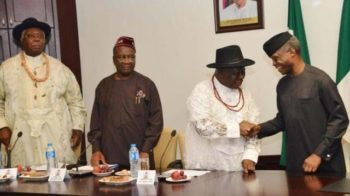
Recent threat by Niger Delta elders under the auspices of the Pan Niger Delta Forum (PANDEF), led by a former Information Minister, Chief Edwin Clark, to pull out of the ongoing peace talks with the government, unless their demands were met by November 1, may have sparked fresh fears that the calmness in the region, which has led to surge in oil production output, may be disrupted again.
It is believed that it was PANDEF’s intervention that brought peace to the region in the midst of disruptive bombings by rampaging militants last year. However, the recent volte-face by the again presents fresh hope.
In a peace tour of states in the Niger Delta earlier in the year, Acting President Yemi Osinbajo had proposed a new vision for the region.
Osinbajo said the Federal Government would begin a partnership with the oil producing communities, states, local government, private sector and civil societies for the rapid development of the Niger Delta.
“We must convene an oil community’s intervention to work out what can be done in the short, medium and long term. We must focus on how to ensure that the people benefit from the wealth of the land,” he noted.
Since the tour, nothing tangible seems to have been heard in terms of addressing the grievances of people in the region.
The story of the Niger Delta is subsumed in devastation caused by large-scale oil extraction for many years by oil majors. A recent analysis by Amnesty International shows that that the oil companies are responsible for more than 550 oil spills within just one year.
“In 2014, Royal Dutch Shell, the fourth largest company in the world reported 204 separate oil spills, while ENI, Italy’s biggest industrial enterprise, which operates in a smaller area in the region reported 394 spills,” said Mark Dummett, a researcher on the business and human rights team of Amnesty International,” adding, “the number of oil spills occurring in the Niger Delta is really disturbing.”
This figure, which is still in contention, was for just one year. Over the years, the number of spills has been humongous rendering the area wholly polluted and the people constantly sentenced as wanderers and rebels fighting for survival.
Although the impacts of oil spills on the region seem devastating, environmental groups have been calling for the oil companies to properly clean up these spills when they occur. But this isn’t happening.
Besides demanding that companies clean up, communities are also seeking compensation, which has benefited some. After major spills in 2008 and 2009, Shell agreed in early 2015 to pay the residents of the town of Bodo in the Niger Delta 76 million euros ($81 million) as compensation for environmental pollution. In June 2016, Vice President, Osinbajo, flagged off the oil spillage cleanup exercise amidst an elaborate ceremony in Bodo, Gokana Local Government Area of Rivers State.
Unfortunately, the ceremony turned out to be just that. The Environmental Rights Action/Friends of the Earth Nigeria, ERA/FoEN, lamented recently that several months after the government launched the cleanup exercise, “not a drop of oil” had been cleaned in the area.
All these constitute the angst of the youths and elders of the region who feel abandoned, leading to militancy in the area.
The Umaru Yardua and the Goodluck Jonathan administrations, bent double by granting amnesty to the militants who laid down their arms. They were trained in certain vocations and monthly stipends paid to them. The Muhammed Buhari government does not totally believe in the amnesty programme but a more robust approach to developing the region. The steps taken by the government to wind down the programme prompted another bout of militancy in the region which almost paralysed the economy.
Although the government embarked on military offensive to cow the youths, it was seen as counter-productive as the economy continued to bleed. It was on this note that Osinbajo started peace tour of the region to calm frayed nerves.
At the heat of contemplating the way forward, PANDEF met with President Buhari, with a sixteen points demand as lasting solution to the lingering crisis and degradation of the environment. This was even as militants and other interest groups in the region showed skepticism for any dialogue and engagements with the Federal Government, as they believed previous interactions produced no tangible results.
However, between the flag off of the peace talks and now, PANDEF believes the government is deliberately playing the ostrich while leaving the region in limbo.
This latest scenario by implication could throw Nigeria into another round of needless militancy, which could further exacerbate the economic situation.
The government should therefore adopt a more proactive approach, by taking advantage of this open window to address the Niger Delta issue once and for all.
Copyright Ships & Ports Ltd. Permission to use quotations from this article is granted subject to appropriate credit given to www.shipsandports.com.ng as the source.